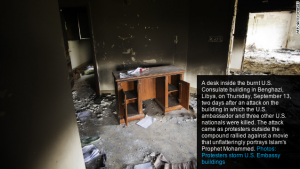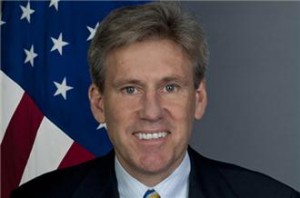About That FBI Investigation of the Benghazi Attack…
The NYT’s Eric Schmitt reports that JSOC is preparing target packages for those who attacked the Benghazi consulate.
The American military’s top-secret Joint Special Operations Command is preparing detailed information that could be used to kill or capture some of the militants suspected in the attack last month in Libya that killed Ambassador J. Christopher Stevens and three other Americans, senior military and counterterrorism officials said on Tuesday.
[snip]
It remained unclear precisely how many of the “target packages” are being prepared — perhaps a dozen or more — but military and counterterrorism officials said that the Libyan authorities had identified several suspected assailants based on witness accounts, video and other photographs from the scene.
“They are putting together information on where these individuals live, who their family members and their associates are, and their entire pattern of life,” said one American official who has been briefed on the target planning now under way.
American intelligence-gathering assets — spies, satellite imagery, electronic-eavesdropping devices, among others — are finite, so counterterrorism authorities preparing the “target packages” must prioritize which militants in Benghazi — or elsewhere if they have fled the area since the attack — need to be monitored on a nearly hour-by-hour, if not minute-by-minute, basis.
To help with this effort since the attacks, the Pentagon has increased the frequency of surveillance drones that fly over eastern Libya, collecting electronic intercepts, imagery and other information that could help planners compile their target lists. American intelligence agencies have assigned additional analysts to concentrate on the suspects. [my emphasis]
Schmitt doesn’t breathe a word about this in yesterday’s article, but four days before he wrote that JSOC article, he contributed to this article describing the FBI’s difficulties investigating the attack.
Sixteen days after the death of four Americans in an attack on a United States diplomatic mission here, fears about the near-total lack of security have kept F.B.I. agents from visiting the scene of the killings and forced them to try to piece together the complicated crime from Tripoli, more than 400 miles away.
[snip]
The Libyan government has advised the F.B.I. that it cannot ensure the safety of the American investigators in Benghazi. So agents have been conducting interviews from afar, relying on local Libyan authorities to help identify and arrange meetings with witnesses to the attack and working closely with the Libyans to gauge the veracity of any of those accounts.
“There’s a chance we never make it in there,” said a senior law enforcement official.


